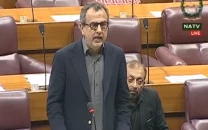'Judiciary, parliament can’t invade each other’s domain'
Lawyer tells IHC no officer of Senate was subject to court jurisdiction

The Islamabad High Court was informed on Thursday that Articles 68 and 69 of the Constitution envisaged that neither the judiciary nor the parliament could invade into the domain of each other.
An IHC bench, headed by Justice Aamer Farooq and also including Justice Tariq Mahmood Jahangiri, was hearing an intra-court appeal filed by Senator Yousuf Raza Gllani against the same court’s decision wherein it had turned down the PPP leader’s petition challenging the result of the elections for the Senate chairman.
Barrister Syed Ali Zafar, who is representing Senate Chairman Sadiq Sanjrani, commenced his argument by quoting British constitutional theorist Erskine May, who had stated that parliament had an ancient right to regulate its own proceedings. As such, any decision or speech made therein, or any rule or procedure could not be questioned by the courts.
Read more: Judiciary must protect other institutions: SC
Zafar submitted that parliament was “master” and “judge” of its own proceedings and that no officer of the Senate was subject to the jurisdiction of the court in respect of exercise of powers relating to “Business of Senate” -- all codified in Articles 66 to 69 of the Constitution.
He also referred to Article 67 of the Constitution to state that just like courts could not question the decisions of the Senate, similarly, the upper house of parliament could not discuss the conduct of judges.
“A complete firewall has been created between parliament and the courts so that the business of the State can continue and both institutions cannot interfere with each other's business ... any such interference would be unconstitutional.”
He then argued that the concept of parliament enjoying absolute control over its proceedings was universal and recognised all over the world, and Pakistani law supported this stance as well.
Also read: Judiciary wants say in NAB chief’s appointment
“Parliament could make its own rules or procedure to regulate its proceedings and the conduct of its business.”
Zafar further informed the court that Gilani had at all times available with him an alternate remedy under Article 53 of the Constitution which provided for ‘motion of no-confidence’ to be brought against the current Senate chairman.
He argued that if Gilani had the requisite numbers in the House, he could have simply availed this remedy instead of breaching his own privileges and those of the House he represented.
The lawyer maintained that tracing the history of Article 66(2) of the Constitution revealed that the privileges of “Majlis-e-Shoora” emanated from those enjoyed by members of the House of Commons.
The hearing was adjourned till August 10 on which Zafar will continue his argument.



















COMMENTS
Comments are moderated and generally will be posted if they are on-topic and not abusive.
For more information, please see our Comments FAQ